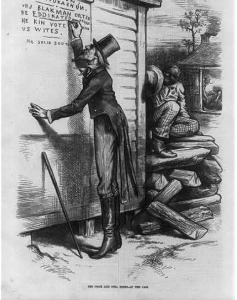3.3 Disenfranchisement
Over time, there has been a global trend to expand the franchise. Voting rights have been extended to groups who did not have legal voting rights, including Judges and people with mental disabilities in Canada, or opening the vote to 16-year-olds in some European countries. Despite the trend, there are still areas where voting rights are being restricted. When a person’s voting rights are denied, restricted or removed, it is known as disenfranchisement.
Incarceration
One group of people who generally do not have the right to vote are prison inmates. Many countries do not allow people to vote while incarcerated, and some countries even deny voting rights after a prison term has ended (Rottinghaus & Baldwin, 2007). There is significant variation between countries.
Prisoners can vote
Some prisoners can vote
Prisoners can’t vote
Post incarceration restrictions
Example: The United States – Disenfranchisement for Convictions
The United States has one of the harshest systems of post-incarceration disenfranchisement. While individual states have some discretion in restricting the franchise after release from prison, 48 states have laws that disenfranchise people with felony convictions (Porter et al., 2021). According to The Sentencing Project, felony disenfranchisement laws have left over 4.4 million Americans unable to vote (Porter et al., 2021). The practice has roots in the country’s history of slavery. In the post-Civil War period, the Fifteenth Amendment, which extended voting rights to black Americans, was written narrowly to allow southern states to pursue other mechanisms for disenfranchisement, including the criminal justice system (Keyssar, 2009).
Registration Requirements
Another method of limiting access to the franchise is to impose burdens on citizens when registering to vote. Most election administrators require voters to prove their identification, often with some type of government-issued identification. These requirements can be crafted to be broad and inclusive, or they can be narrowly tailored to exclude specific groups or classes of people. In the United States, most states accept driver’s licenses or passports as valid forms of identification, but there is variation by state. For example, Michigan accepts student ID cards as a valid form of identification. Texas does not accept student ID cards, but a handgun license is considered sufficient (Voteriders, n.d).
Example: The United States – Restrictive Registration Practices

In the aftermath of the Civil War, southern states enacted literacy tests, grandfather clauses, and other requirements intended to disenfranchise Black voters in Alabama, Georgia, and Mississippi. Literacy tests were long and detailed exams on local and national politics, history, and more. They were often administered arbitrarily, with more African Americans required to take them than White people. Poll taxes required voters to pay a fee to vote. Grandfather clauses exempted individuals from taking literacy tests or paying poll taxes if they or their fathers or grandfathers had been permitted to vote prior to a certain point in time. While the Supreme Court determined that grandfather clauses were unconstitutional in 1915, states continued to use poll taxes and literacy tests to deter potential voters from registering. States also ignored instances of violence and intimidation against African Americans wanting to register or vote.
“7.1 Voter Registration” from American Government 3e by OpenStax – Rice University is licensed under a Creative Commons Attribution 4.0 International License, except where otherwise noted.—Modifications: Used section Voter Registration Across the United States, reworded, and summarized.

